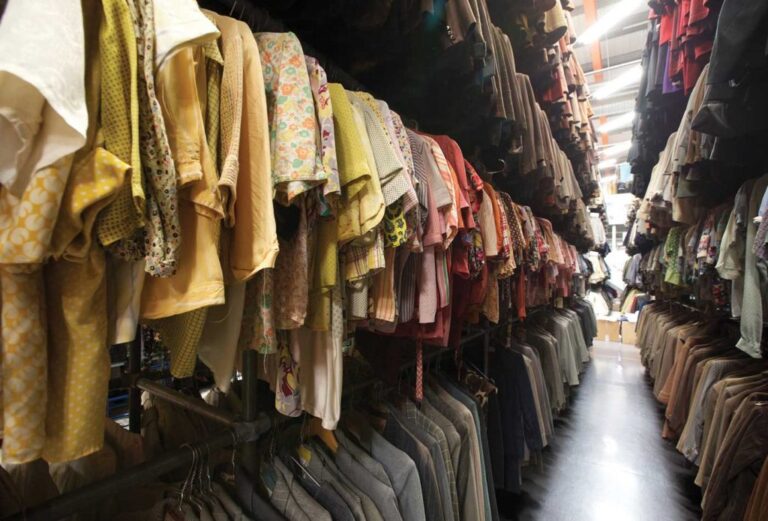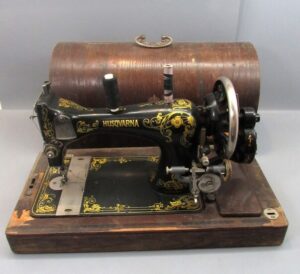Competition for jobs in the arts is staggering; especially for full time positions – with regular pay packets, job security, holiday pay etc. But with so many people vying for a handful of jobs do standards slip? Do larger companies push what they can get away with because they know there’s plenty of other people who’ll take the job..? Unfortunately yes. This is one wardrobe assistant’s account of working on a musical in the West End.
[This article is their own words with parts edited in after we interviewed them]
The Wardrobe Department
After three years freelancing I started working as a full time Wardrobe Assistant on a musical in The West End. I was paid £600 before tax for a 37 hour a week buyout. Whilst I was learning the principal track, a former Wardrobe Mistress for the show warned me that any job after this one would be better.
The department consisted of a Wardrobe Mistress, Deputy, Assistant (me) and one Dresser. There was a cast of 22 and each of the ensemble members had approximately nine costumes each. There were four dressing tracks and so every member of the department was required to dress. This is not the norm for a show of this size because it meant no one was on standby, and so if something went wrong we were hard-pressed to deal with it.
Since I have left I have heard another dresser was employed, proving that the time I worked there we were understaffed.
Deps
A large part of being a good dresser is the ability to remain calm, to provide an atmosphere that keeps the cast member as stress free as possible, which in turn allows them to perform at their best. Unfortunately it was hard for us to maintain this environment.
As three members of the team had swing days there was always one dep dresser each week. It resulted in a high turnover of staff, meaning there was very little consistency for us, and the cast and the show in general. The department regularly ended up with only three people running the show. The constant new staff meant we were teaching tracks every week, far more often than is normal.
In order to help cut down on the reliance on Deps, the deputy and I learned all four plots so that the Deps could stick to doing the same track whenever they were needed to give the performers as much continuity as possible, unfortunately this didn’t always work. Sometimes the Deps had barely learned the track before they did it and sometimes new Deps were brought in to do a track blind.
At its worst, we were a department of two after a virus took out half of the department, I was left in charge with a Dep who only knew the easiest of the tracks. Thankfully, other members of the company rallied round to help make the show happen. Despite us miraculously pulling off the show, we made sure that the show report didn’t include any praise for us for doing so…we knew that if management read that, they’d think about cutting the number of staff in the department since it was potentially possible to run the show with fewer staff. There would have been no way we could have survived long term if that happened.
Head Office
The head office was the biggest problem. They had no experience in running a show longer than a few months and had no previous experience of running a show in the West End. Quick fixes were preferred over long-term solutions. If laundry equipment broke, instead of immediately getting it fixed or replaced, the office suggested several trips to the laundrette as part of the daily laundry call. Separate staff did the laundry calls so it wasn’t us having to carry that extra burden.
Cast members constantly complained that their costumes smelt and there was nothing we could do about it. We had complained to head office that the machines were making the costumes smell awful and they responded by sending us Youtube videos on how to bleach wash a washing machine. No amount of bleach washes fixed the problem, so we continued to take the brunt of the cast’s frustration. Eventually after a few weeks a member of the in-house theatre management team fixed the machine.
The Lack of a Costume Supervisor
The show had never had a costume supervisor to liaise between the wardrobe department and the designer. And the designer wasn’t helping to fight our corner either. Costume supervisors are essential especially on large-scale shows. And the lack of one put immense pressure on everyone in the department. There was also no show bible. Until one wardrobe mistress who was leaving took it upon herself to create one, to give the next HOD a fighting chance.
Cast Change
During my time there the show was updated, which did give the show a new lease of life. But the reality hit a few months later when we had a cast change, and we realised the budget had been slashed to accommodate the cost of updating the show.
The new cast were given hand-me-downs from the previous cast, which is normal and it’s good to recycle costumes but these were passed their best. Some iconic costume pieces were completely left out, as they didn’t fit the new cast.
We hired two Deps so the HOD and Deputy could do all the alterations. No one was brought in to help with these and they weren’t straightforward either. As the budget was minimal it was a case of “here’s these old costumes – make them fit”. This was on top of being in tech and on top of all the day-to-day jobs that a HOD and Deputy need to do.
For one dance number the company bought trousers from Primark. And obviously they weren’t fit for purpose so the HOD had to spend their time putting gussets in them all. It’s just another example of the company saving money by forcing an already stretched department to take on more work. If they had hired a costume maker to make these trousers they would have been the right size and not split straight away.
We also had one dancer who was a slightly bigger build so regular high street clothing didn’t fit them. The HOD tried different things, such as bigger gussets and extra stretch panels, but in the end we had to buy a new suit. Which we knew was the answer in the beginning but the company wouldn’t pay for it. So the HOD wasted hours altering and re altering a pair of trousers for the company to eventually buy them a pair anyway.
Companies need to listen to the people that are experts in their field.“This costume item will not work. So if you spend the money on the costume now, I won’t waste my time and spend more money on fabric/ supplies to show you it doesn’t work, and for you to end up spending the money on the costume after all”
Dancers didn’t get second sweat t-shirts and given the nature of the show they ideally needed a different sweat top for each act. On two show days the cast would have to put on the same sweat tops, tights and socks. We ended up tumble-drying them between Saturday and Sunday shows, as there wasn’t time to wash and dry them.
We made the decision to buy these for our dancers out of our petty cash, which had a significant impact on our petty cash reserve. While most of the cast appreciated this, some of the cast didn’t and would damage key items. Their frustration was understandable but they ended up taking it out on the people who were the ones trying to make the bad situation better. Again we took the brunt of their frustration. Because of the lack of petty cash, we’d regularly end up in situations where we had to decide on whether to try to repair damaged shoes or buy essential laundry products.
The cast change day itself was easily the most hellish days I’ve ever experienced. The cast were being taught their costume tracks, whilst fittings were being done during the dress run. Official photographs were taken during the run and a Dep had to relearn the show just before the cast’s first official show later that evening.
The Effect on the Team
Morale in the department was always incredibly low and everybody was constantly stressed. Staff didn’t tend to stay long as a result. During my time I had three HODs. I have very few fond memories of working there. The few that I do have are small moments of relief when we’d pull something difficult off and celebrate that we’d gotten through it together. The small moments with people that I bonded with during that time.
The Effect on Me
Between the broken equipment, the constant pressure to repair expired costumes with little resources, constantly having to teach new deps tracks, looking after emergency cast members on a regular basis, and absolutely no positive feedback, the toll on my mental health was substantial. I’d call my partner in floods of tears frequently because of the constant negativity from the job. I was convinced that I was the worst person working in wardrobe and would have full panic attacks.
Feeling socially isolated by the unsocial hours as well made everything worse. Eventually I’d had enough and handed my notice in with plans to live off of my savings for a while as that would be better than staying there. Thankfully I was immediately offered a dep job with a show I’d previously worked on, so it didn’t come to that.
My five year goal when starting as an assistant was to eventually be wardrobe mistress in charge of my own team but when I left that show, I hated theatre and had lost total confidence in my sewing skills. That show had stained my love for theatre and isn’t fully repaired yet. Fortunately, my confidence eventually came back and the shows I’ve worked on since have all been substantially better.







